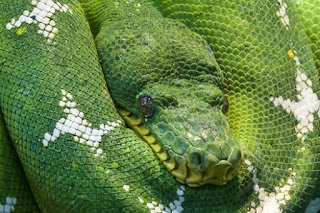In direct contrast the temptation of Eve and Adam (Gen. 3.1-7), created in God's image is the same as that offered to Christ but the responses given are very different. The same choices are given to us daily and our response is ours to give but our mindset is not that of God / Christ. Too often our response is still the response of Adam and Eve rather than Christ / God. Looking generally at what we are offered each day in line with the temptations that Christ / Adam / Eve are offered we can see that it is food, fame and power/authority. We all have to have some form of energy to live, irrespective of who we are but it is what we do with our energy source that is at stake. Adam / Eve were placed in a garden that produced all the food that they would ever want. The food was provided by God and if we have faith than God will provide for our needs as he did for the first humans. Christ acknowledges this as he is tempted with food at the end of his fast. Do we think of Eve's temptation as a temptation of food? Not really but that is ultimately the serpents approach. (Gen 3.1). The serpent appeals to the gustatory experience and then moves onto other temptations. We utilise our food resources for our benefit, our profit, our GDP, etc., while the world goes hungry. We bemoan the fact that there is famine but lock up food so that no one can have the food unless we can profit from it,. If not ourselves than certainly the multi-corporates that control our food chain. Is this not the same temptation that is on offer. God provides us with food but we (temptation) do not allow it out of our hands. Have we no compassion, can we not see with Christ like eyes those that are in need, overcoming poverty and hunger may solve many of our burdensome population growth problems.
The coils of the serpent surround us still
But then we wilt lose out on our fame and fortune, to be like God (temptation 2), coming in and saving the day acting as if it is out of beneficence that we give our stocks away. Look at the mileage that we will get out of our 'charity' rather than out of a sense of God's graciousness. The generosity that is used to provide food is a source of pride and self aggrandisement. The press is there we are famous for a day and a half. Our twitter feed will go through the roof and we will have so many likes on Facebook that we will be like God. Not only do we seek God's grace but we look for our own prosperity and popularity rather than giving thanks for the goodness God brings. What else did Adam and Eve require when in the garden? Why did they require popularity or the notoriety of becoming like a God? Why, Why, Why? We look around the world today and to get on we have to become popular it would seem. The biggest twitter feed, more likes than Donald Trump on Instagram, etc. All God would like is our attention on God not on ourselves because then we may see the poverty and desperation around us. The injustices caused by our incessant need for popularity.
Then of course the final installment. Becoming like God in popularity is not enough we have to have the power. Jesus' response is the correct one because we are not up to creation but God is and I am sure he weeps over our drive for God's power. Just stop and think about wanting power. Remind yourselves that with power comes responsibility not only for those around you, beneath you but also those who want your place. All of it takes time, effort and work. Adam and Eve did not have their work cut out in the garden but as soon as they achieved power they had to work to maintain everything. The consequence is greater than the wished for power. We have to start relying on ourselves which eventually drives us away from all the good. We isolate ourselves in our hunger for power. We are thrust out of the supporting community as we seek power. Acknowledgement of God and opening our eyes to Christ show us the relationships and support that fill our lives with love. WE gain hope and security as we find we do not have to fight tooth and claw because God's graciousness fills all our needs. Only when we can see as Christ will we see our own faults and driving brokenness.

No comments:
Post a Comment